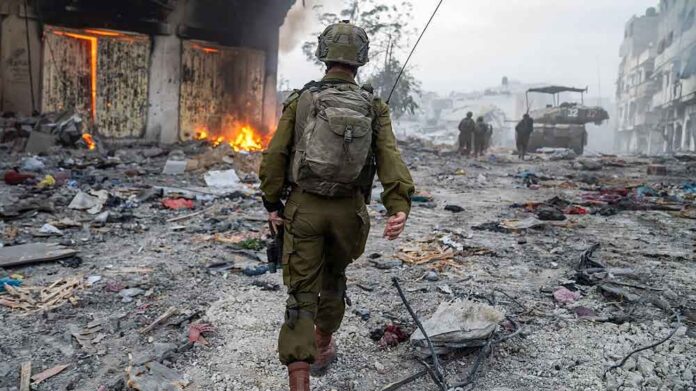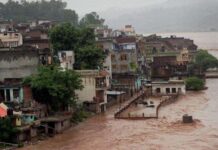Even as the 2023 turned out to be literally the hottest year in history, West Asia continued to face the equally destabilizing heat in the old and new hotspots. The ongoing wars and conflicts do not portend well for 2024. Hence, more disruptions could be witnessed. According to the Council on Foreign Relations (CFR), 53% of the world’s proven oil reserves, and half of all natural gas reserves are in the Middle East. These two natural resources account for 51% of all exports from the region.
By Amb Anil Trigunayat
Yet the region is most volatile and replete with paradoxes as it has the richest and the poorest countries which have been differently impacted by the strands of Arab Spring, pandemic, climate Change, food insecurity and energy surplus and deficits. It also remained mired in ongoing conflicts in Libya, Yemen, Syria and Iraq as Lebanon and Sudan suffered the internal turbulence. However, reforms in the Arab world especially in Saudi Arabia and some other GCC countries continued and may continue even at a higher pace as the nations with their 2030 Visions gradually materialize and petro dollars keep funding these initiatives.
One of the most important and significant developments was the diplomatic rapprochement between Saudi Arabia and Iran- two predominant regional rivals and powers engineered by Iraq, Oman and eventually steered and carried through by China since March 2023. Iran’s hold and support to Houthis in Yemen who had become more intractable in last seven years, was another major factor for Riyadh to diffuse tensions with Tehran. At the same time the other regional countries also began to realize the distraction and dis-interest of Washington DC for the Sunni belt, due to their Sino-centered focus on Indo-Pacific to counter China, and consequent concern and unreliability of the disappearing US security umbrella.
This did not mean that their quest or dependence on US defence supplies became any less. This also led to several other countries trying to normalize ties with their regional neighbours. Turkey, suffering from economic downturn, had to scale down militarizing its foreign policy and support to Muslim Brotherhood and made an outreach to repair ties with UAE, Egypt, Saudi Arabia and others as President Erdogan won yet another electoral victory despite all odds.
Most regional countries especially the oil rich countries expanded their foreign policy with a focus on ‘Act East’ to compensate for perceived withdrawal of US from the region. The policy entails closer cooperation with their hydrocarbons markets in China, India, Japan and South Korea with whom they also nurtured their strategic partnerships. Several high level visits and exchanges from and to China, Russia and India would easily attest to that. President Xi Jinping, President Putin and PM Modi all maintained engagement with their major regional counterparts.
President Biden’s dull visit to repair the ties was often compared with the high profile visits of Xi Jinping and Putin to the region. Within the compass of OPEC+ they continued to collaborate with Russia on crude oil production cuts to maintain market stability and their profit margins much to the chagrin of the Americans and the West even as they diverted more supplies to Europe to compensate for sanctioned Russian oil and gas . UAE became a major hub for Russian trade as the major Gulf countries refused to subscribe to US prescribed sanctions regime. Iran remained defiant against the US and western sanctions and further entrenched its ties across the spectrum with Russia and China.
Iran also became a full member of Shanghai Cooperation Organisation (SCO) under India’s presidency with Saudi Arabia, UAE, Egypt and Qatar etc. becoming dialogue partners. Likewise, at the Johannesburg BRICS Summit Egypt, UAE, Iran and Saudi Arabia were admitted with effect from January 1, 2024. There are about 30 more countries waiting to join this BRICS Plus. This clearly indicates that countries in West Asia are looking to not only diversify their economies but also their political preferences and balance of interests. This might give an impression that some other alternate bloc may have emerged. Not yet- but can be in the offing as the international disorder continues to prevail and reliance on national currencies or newer arrangements, at the expense of the US dollar hegemony, expands.
Yet another significant development was inclusion of Syria back into the Arab embrace and the Arab League despite the US objections and the so called Caesar’s Act. This was also an admission that Assad is here to stay as the Russian support to him remained strong and was also perceived as Moscow’s rewarding loyalty programme by the region despite itself being embroiled in the prolonging conflict with Ukraine that had created difficulties as well as opportunities as far as food security and energy windfalls are concerned.
As the impact of the pandemic and the Russia -Ukraine war were being calibrated and adjusted by the region and high hopes for further rapprochement and expansion of Abraham Accords was being envisaged with Saudi Crown Prince Mohammed bin Salman consenting to normalize ties with equally enthusiastic Netanyahu leading an ultra-rightist coalition government, the unprecedented Hamas terror attacks of October 7 derailed the immediate prospects of regional de-escalation and other intra-regional projects. For the Biden Administration this Riyadh-Tel Aviv tango would have been a big foreign policy achievement as Riyadh was looking to secure guarantees and nuclear option from the US in return. However, the Israel -Hamas conflagration even led to cancellation of the Summit of key regional leaders with Biden when he dashed to Tel Aviv, due to his role and support to Israel. This has made US role quite questionable yet again.
Netanyahu had vowed to avenge the death of 1400 (subsequently brought down to 1192) innocent civilians and release of 240 hostages (of whom 108 were released during a weeklong temporary truce) by destroying the Hamas, once a part consort, and has launched the sweeping air bombings and a ground offensive across the most densely populated region. More than 20000 civilians including over 8000 children have been reportedly killed and counting goes on as over 1.9 mn Palestinians and over 500000 Israelis have become internally displaced. Due to these indiscriminate bombing campaigns and excessive civilian casualties, Netanyahu seems to have frittered away whatever global sympathy Israel had gained in the aftermath of terror attacks, which even Biden had to concede as civilian casualties rose by the day.
Calls for immediate ceasefire and uninterrupted humanitarian assistance to the besieged Gazans has grown louder with UNGA and diluted UNSC resolutions aiming to achieve that feat. But so far Netanyahu, backed by USA, remains averse to the ceasefire till his objectives have been achieved. However, domestic and international pressure have been mounting on the Israeli government as the perception of him continuing with the war to save his political career and absolve himself of the unpardonable security lapses and breaches continued. His handling of the hostages also came under tremendous criticism, as even after three months they remained in the custody of Hamas.
Though there was no great sympathy for the Hamas, even in the Arab world, the Israel- Hamas war was able to recharge the Arab street with the Palestinian cause and plight forcing their leaders to retract especially as the civilian casualties and strife continues to mount. Hamas may be losing militarily but there could be a strategic defeat for Israel since most of the Arab countries would find it difficult to move on unless some solution to the Palestinian issue is found. Besides, Hamas claims to have busted the myth of Israeli invincibility and dependability and credibility as a security partner for the Arab world, trying to normalize ties with the Jewish state. It is not to say that there is a uniformity of opinion and approaches among regional majors which was evident during the Arab and Islamic countries Summit in Riyadh even as some of them recalled their Ambassadors. Turkey and South Africa particularly took up the cause and called the indiscriminate killings of Palestinians as a genocide by Netanyahu.
South Africa even filed a case in the International Court of Justice. But even though Arab Foreign Ministers went on a shuttle diplomacy and issued statements no concrete action military or economic against Israel was witnessed. Qatar and Egypt tried their best to effect negotiations for ceasefire and release of hostages through trilateral discussions as the CIA and Mossad Chief and Secretary Blinken engaged in intensive shuttle diplomacy in Doha. UAE even hosted the Israeli President Herzog at the COP 28 in Dubai and confirmed that projects under I2 U2 (an alliance with India, UAE, USA and Israel) will move apace and will not be impacted due to the ongoing conflict. Despite that, general indications are that the business as usual will be difficult to carry on unless some resolution of Gaza and the Palestinian issue is found by the international community and perhaps this is the time to embark on that much awaited venture.
All was not lost as in the wake of Houthi drone and other attacks, a UAE led initiative, in pursuance to the recent New Delhi G20 Summit Declaration on Countering the Use of New and Emerging Technologies for Terrorist Purposes, Abu Dhabi Guiding Principles forthe use of UAVs for countering terrorism were adopted by the Counter Terrorism Committee (CTC) of the UNSC in a first of its kind document. These address the threats posed by the use of unmanned aircraft systems (UAS) for terrorist purposes.
UAE’s COP 28 despite inherent contrasts and debates on phasing out of fossil fuels was a reasonable success as the Loss & damage Fund and several other initiatives were launched to fight the climate change. PM Modi also propagated his ‘Green Credit’ initiative as the agreed provisions of New Delhi G20 Declaration were also carried forward including tripling of the renewable energy mix.
India’s Outreach
India continued to engage with the West Asian countries mostly within the bilateral matrix across the spectrum. During her G20 Presidency India invited her strategic partners UAE, Oman and Egypt. Saudi Arabia is as such a part of G20 whose Crown Prince stayed on for the state visit after the Summit in September. However, the sub regional initiatives like the I2U2 and IUSU (India, UAE, Saudi Arabia and USA) and the new connectivity corridor –IMEC (India Middle East Europe Economic Corridor) announced on the sidelines of the G20 Delhi Summit, indicated that New Delhi was expanding its footprints in the regional landscape without getting entangled in the regional hotspots and complexities while urging the resolution of conflicts and differences through dialogue and diplomacy. No doubt these have come under stress due to the ongoing Israel-Hamas war and greater polarization.
PM Modi visited UAE twice in the year and also developed strategic ties with Egypt during his visit. However, the Israel- Hamas war also tested Indian diplomacy more than in the past. While it tried to take a principled position with regard to terror attacks by Hamas on Israel and subsequent statements on Two state solution as well as humanitarian assistance and concern for Palestinian civilian casualties, neither side seemed very impressed. Its position at the UNGA votes evolved and became more balanced. Palestinians and Arabs expected India to use its good offices with both Tel Aviv and Ramallah to diffuse the crisis more proactively like the magic it had been able to pull off at the G20 Summit. In any case PM Modi conferred regularly and urgently with his major counterparts in the region urging de-escalation as he ensured Indian humanitarian relief supplies for the Gazans.
Although Qatar emerged as the major supplier of natural gas and a major interlocutor both in Taliban and Israel -Hamas conflicts especially for the US, one witnessed certain irritants especially when 8 Indian naval personnel were arrested and awarded death penalties which subsequently was commuted to prison sentence, most likely as a result of PM Modi’s meeting with Qatari Amir Sheikh Tamim on the sidelines of COP 28 in Dubai. Earlier, unpleasantness and discomfort were noticed during the visit of Indian Vice President to Doha (November, 20 22) in the wake of Nupur Sharma controversy. Despite that, Qatar remains a major partner for India but perhaps requires smoother and smarter handling.
Towards the end of the year as two Indian commercial ships were hit/ confronted by Houthi missiles and drone attacks in the Red Sea, India had to deploy naval assets while leadership continued to confer with other partners in the region so that the conflict does not expand beyond, which will have disastrous consequences for the region and the world.
A More Distraught 2024 ..
2024 has not begun with any immediate prospects of peace or stability in the region even as efforts by all major powers continue to limit the theatre of war from expansion. The US seems to have lost its credibility and reputation in the Arab world as an objective security partner due to their unstinted support to Netanyahu’s war but whether that will change post next US elections or in 2024 appears unlikely due to the domestic dynamic. Russia and China will not be able to fill that vacuum but they are being perceived as key important and reliable actors and would try to squeeze out that US strategic space for themselves. As such there are real fears of more intense radicalization and reemergence of various ultra terrorist groups in the region in response to the Israel’s war in Gaza and the way it will play out with Netanyahu trying to retain suzerainty thereafter.
However, if Iran directly gets dragged into the war the worst conflagration of the war could become a reality with Hamas, Hezbollah and Houthis (Iran’s 3 H) on the loose, consequences even for India will be extreme and difficult to fathom. Meanwhile, strategic autonomy and diversification of relationships is likely to be the trend in the region for all major players as they will try to keep the conflicts from blowing up further and will keep their options open to serve their own interests. More countries might join BRICS under the Russian presidency which will create its own dynamic in the fragile and unbalanced global architecture. We may also witness greater Arab agency in the West to counter the supremacy of Jewish diaspora influence especially in the USA during the election year.
All in all uncertainty and short fuses might define the New Year fraught with old problems. And will be called upon to play a more proactive role.
This article first appeared in www.vifindia.org and it belongs to them.








